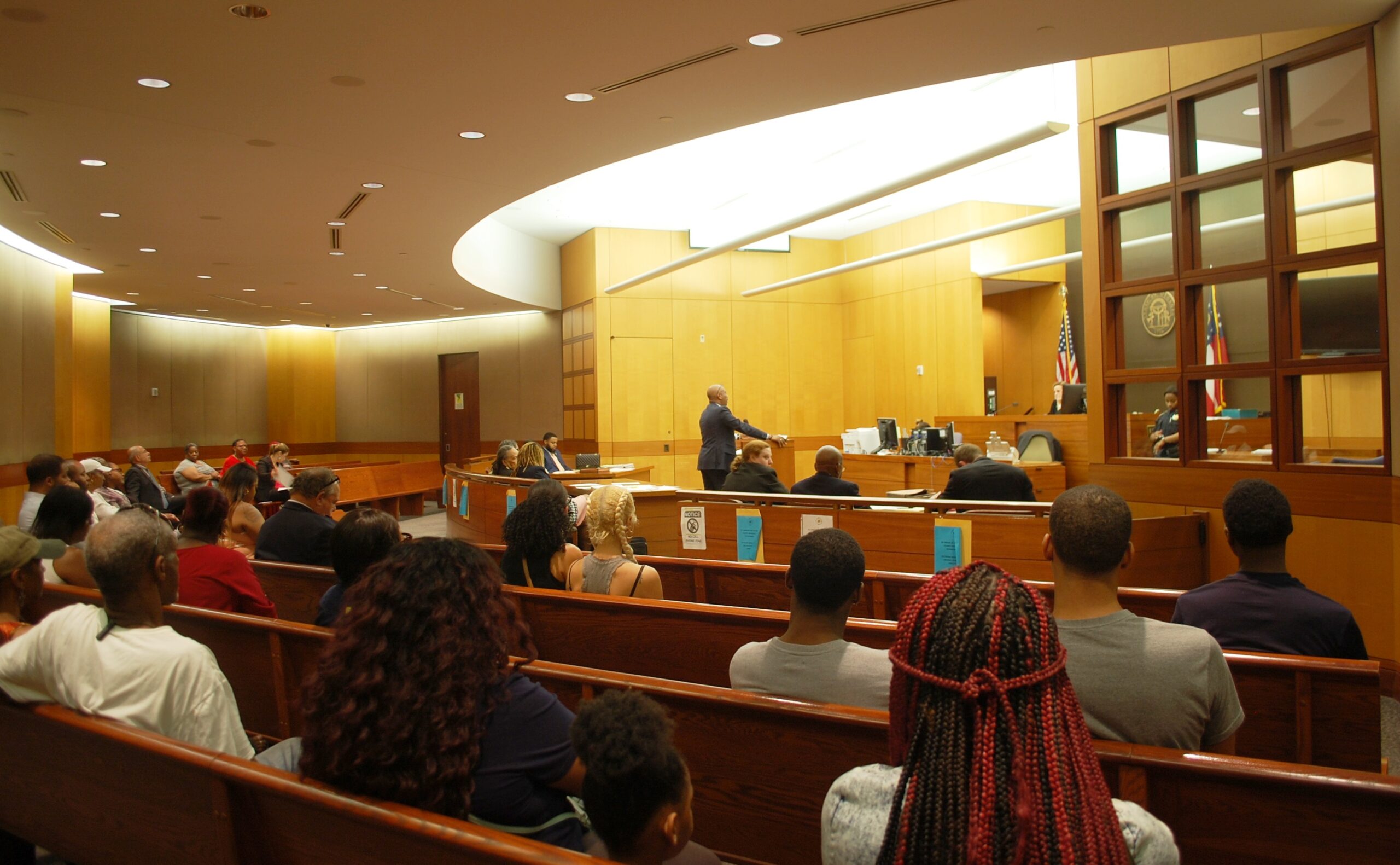A decade ago, the Great Recession was pushing many Georgians out of their homes. Today, the housing market is upbeat and the economy is booming.
But hard times drag on for many — especially renters. Georgia’s courts handled 200,000 eviction lawsuits last year, according to research done at Princeton.
As part of a series called “Still Struggling,” WABE heads to the final eviction hearing of the day at Fulton County Magistrate Court.
***
One thing separates the 3 p.m. eviction cases from those heard earlier in the day. At 3 p.m., all of the tenants lose.
On this day, dozens of tenants sit on benches in Courtroom 1B. Some are clutching documents. A couple are wearing work uniforms.
In front of them, six attorneys sit at tables facing the judge. They represent landlords.
The court security officer gives some brief instructions. And the hearing begins. For each case, the clerk calls two names: the landlord’s, then the tenant’s.
When a landlord is called, one of the attorneys stands: “landlord.” When a tenant is called, one of the people gets up from the benches: “tenant.”
And it goes on like this until more than 40 cases are called.
Then, the judge, Jessy Lall, moves the hearing forward.
She tells the room she is ruling in favor of the landlords — all of them. To the tenants, she says, you have a week to leave your homes.
And that’s it. In less than 15 minutes, the 3 p.m. hearing is done.
People who work in the court system can tell you 3 p.m. isn’t just an unlucky time of day. The hearing is based on what tenants wrote on the forms they filed with the court beforehand.
“They have said things like I can’t afford to pay. I lost my job or I plan to pay,” said Heather Johnson, an attorney with the Rushing Firm who typically represents landlords.
She and Erik Provitt, who defends renters, said the 3 p.m. tenants often give personal stories that don’t mean much in court.
“While it is unfortunate that individuals are unable to pay their rent as a result of those things there’s not a legal defense to it,” Provitt said.
So the court groups these cases together.
Fulton County Chief Magistrate Judge Cassandra Kirk, who presides over the court, says it has to. It receives 40,000 eviction filings each year.
“It’s a volume and it’s an expediency. And also we want to give an opportunity for those people with defenses to be able to be heard,” she said.
Kirk is talking about people with legal defenses against their evictions. There are hearings for them throughout the day.
And she added the court has a housing assistance clinic where tenants can learn about what constitutes a legal defense.
For the tenants who don’t have one and get scheduled for 3 p.m., Kirk said individual hearings won’t make much of a difference.
“If your only defense is I didn’t pay the rent because I have no money. Having a hearing is not going to stop the process going forward,” Kirk said.
But through the renters’ eyes, the three o’clock calendar can look different.
While the judge, the clerk and the attorneys all know the tenants will lose, the tenants themselves often don’t.
“I was like what?” Brittany Delaney said, describing the experience.
Delaney said she arrived at 3 p.m. expecting a typical court hearing, where she could explain the details of her situation to the judge.
“But I didn’t get to do that. It was just like well I made a ruling on the apartment’s behalf. You have seven days to get out,” she said.
It made Delaney feel helpless. She’s 29 and a single mother. She worried what an eviction would mean for her daughter.
“How do you explain that to a 7-year-old that you can’t stay where you stay for the past five years?” she said. “So it’s just really been hard for me and then to go to court and basically not be told anything. I’m just like what do I do.”
Delaney is now moving into a room at her parents house with her daughter.
Johnson, the landlord attorney, points out that not all of the 3 p.m. cases end this way. In the week that the judge gives tenants, some come up with the past due rent.
“So most of our clients are there desperate to try to work with the tenant and to the point where they will let certain things go,” Johnson said.
Still, Provitt, the attorney from earlier, who is with the Atlanta Volunteer Lawyers Foundation, said it is hard to see so many receive rulings for their evictions in just a matter of minutes.
But the hearing isn’t really to blame.
“It is a direct result of the laws in the state of Georgia,” Provitt said, meaning laws that make evictions easy and so numerous here.
“The three o’clock calendar is the byproduct of that. It is not the the cause.”
At the courthouse, after the tenants learn about their evictions, they file out of the room, quiet and a little stunned.
Down the hall, a similar scene is unfolding. Fulton County’s 3 p.m. hearing takes place in two courtrooms, twice a week.









